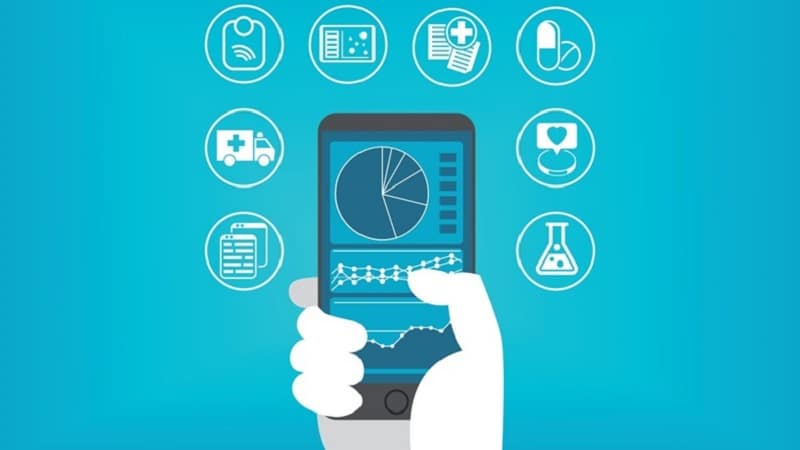The healthcare industry has witnessed a remarkable transformation with the integration of digital technologies.
Digital healthcare offers numerous benefits, including convenience, accessibility, and improved patient outcomes. In this article, we will explore 14 effective ways to Get Digital Healthcare and revolutionize your medical experience. From telemedicine to wearable devices, these advancements are shaping the future of healthcare delivery.
Telemedicine: Connecting Patients and Doctors Remotely

Telemedicine has emerged as a game-changer in the healthcare landscape. By leveraging video conferencing and secure messaging platforms, patients can now consult with healthcare professionals from the comfort of their homes.
Telemedicine provides convenient access to medical expertise, saves travel time, and reduces the burden on overcrowded clinics.
Mobile Health Apps: Managing Health at Your Fingertips
Mobile health applications have become indispensable tools for individuals seeking to take control of their health. These apps allow users to track vital signs, monitor chronic conditions, set medication reminders, and access personalized health information.
With features like symptom checkers and virtual consultations, mobile health apps empower patients to actively participate in their healthcare journey.
Electronic Health Records (EHR): Enhancing Communication and Efficiency
The adoption of electronic health records (EHR) has transformed the way healthcare providers manage patient information. EHR systems enable secure sharing of medical records between healthcare professionals, resulting in improved coordination of care.
Patients benefit from reduced paperwork, seamless information transfer, and a comprehensive view of their medical history.
Wearable Devices: Monitoring Health in Real-Time
Wearable devices, such as smartwatches and fitness trackers, have gained popularity for their ability to collect and analyze health data in real-time. These devices can track heart rate, sleep patterns, physical activity, and more.
By integrating wearable devices with healthcare apps, individuals can proactively manage their well-being and receive personalized health insights.
Virtual Reality (VR) and Augmented Reality (AR): Enhancing Medical Education and Therapy
Virtual reality and augmented reality technologies have extended their applications beyond gaming and entertainment. In the healthcare domain, they offer immersive experiences for medical education, surgical simulations, and therapy sessions.
VR and AR help healthcare professionals enhance their skills, improve patient education, and provide innovative treatment options.
Remote Patient Monitoring (RPM): Continuously Monitoring Vital Signs
Remote patient monitoring involves using connected devices to track and transmit patient data to healthcare providers. RPM enables the proactive management of chronic conditions, early detection of abnormalities, and remote patient care.
By utilizing RPM, patients can minimize hospital visits, receive timely interventions, and enjoy a higher quality of life.
Artificial Intelligence (AI): Advancing Diagnostics and Personalized Medicine
Artificial intelligence has revolutionized healthcare by enabling advanced diagnostics and personalized treatment plans. AI algorithms can analyze vast amounts of medical data to detect patterns, predict outcomes, and identify potential risks.
From radiology imaging to genomics, AI-powered tools are transforming the accuracy and efficiency of medical decision-making.
Online Patient Portals: Empowering Patients with Information
Online patient portals provide patients with secure access to their health records, test results, and appointment schedules. Patients can conveniently communicate with healthcare providers, request prescription refills, and access educational resources.
Patient portals promote transparency, empower individuals to take an active role in their care, and enhance communication with healthcare teams.
Remote Prescription Services: Convenient Medication Management
Digital healthcare has simplified the process of managing prescriptions. Remote prescription services allow patients to request medication refills online, receive electronic prescriptions, and have medications delivered to their doorstep.
This eliminates the need for physical visits to pharmacies, saving time and ensuring medication adherence.
Virtual Support Groups: Connecting Patients for Emotional Support
Virtual support groups provide a platform for individuals facing similar health challenges to connect, share experiences, and provide emotional support. These online communities create a sense of belonging and help patients cope with their conditions.
Digital platforms enable individuals to join support groups regardless of their geographical location, fostering a supportive network of individuals who understand their journey.
Personal Health Records (PHR): Managing Your Health Information
Personal health records (PHR) empower individuals to take control of their health information. PHR platforms allow patients to securely store and manage their medical records, test results, immunizations, and allergies.
With PHRs, patients have a comprehensive and up-to-date overview of their health history, which can be easily shared with healthcare providers for accurate diagnoses and treatment plans.
Remote Rehabilitation: Accessing Therapy from Anywhere
Digital healthcare has revolutionized the field of rehabilitation by offering remote therapy sessions. Through video conferencing and specialized applications, patients can receive virtual rehabilitation services, including physical therapy, occupational therapy, and speech therapy.
Remote rehabilitation provides convenience, eliminates transportation barriers, and enables individuals to receive consistent care in the comfort of their own homes.
Health Chatbots: AI-Powered Healthcare Assistance

Health chatbots leverage artificial intelligence to provide personalized healthcare assistance. These interactive virtual assistants can answer medical questions, offer symptom assessments, provide basic health advice, and direct users to appropriate healthcare resources.
Health chatbots enhance accessibility to healthcare information, especially for individuals in remote areas or those with limited access to healthcare professionals.
Genetic Testing and Personalized Medicine: Unlocking Your Unique Health Profile
Advancements in genetic testing have opened doors to personalized medicine. By analyzing an individual’s genetic makeup, healthcare providers can tailor treatments and preventive strategies to suit their specific needs.
Genetic testing allows for early detection of genetic predispositions, optimizing disease prevention and treatment outcomes. Embracing genetic testing and personalized medicine can revolutionize the way individuals approach their health and well-being.
Conclusion
Digital healthcare has transformed the medical experience by offering innovative solutions that enhance accessibility, convenience, and personalized care. From telemedicine and mobile health apps to wearable devices and AI-powered diagnostics, these advancements are reshaping the healthcare landscape.
By embracing these 14 ways to get digital healthcare, individuals can take control of their health, improve communication with healthcare providers, and achieve better health outcomes. The future of healthcare lies in the seamless integration of digital technologies, empowering individuals to lead healthier and more fulfilling lives.
